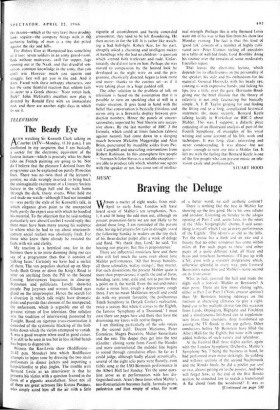TELEVISION
The Beady Eye
AATER watching Sir Kenneth Clark talking on Courbet (ATV—Monday, 11.10 p.m.), I am confirmed in my suspicion that I am basically a sucker for the electronic equivalent of the lantern lecture—which is precisely what his three talks on French painting are going to be. Nor do I believe that the pleasure I derived from the programme can be explained on purely Proustian lines. There was no twin thud of the lecturer's pointer, no slide wrongly inserted, to bring back the unimaginable excitement of a Literary Society lecture in the village hall and the walk home through the dark, frosty streets. What held me and made me watch—although I had not intended to—was partly the style of Sir Kenneth's talk, in which elegance gives point to the unexpected barb, partly the expert ease with which he handled his material. To the objection that he said nothing particularly new about Courbet I would reply that there must have been many among his audience to whom what he had to say about nineteenth- century social realism was absolutely fresh. For those who knew them already he restated the facts with wit and clarity.
My reaction is a heretical one, for in the business there is no more damning thing one can say of a programme than that it consists of 'talking faces.' Certainly we have had a surfeit of them. The vox populists sharked up on Shep- herds Bush Green or down the King's Road to utter on anything from the Pill to the Second Coming. Interviewees loquacious in close-up. Statesmen and politicians. Lovely show-biz people. Pop jurymen and women. Glazed eyes glued on the teleprompter. Hence the search for a situation in which talk might have dramatic point and provide that element of the unexpected, the unforeseen, which is arguably one of the greatest virtues of live television. One solution was the tradition of interviewing pioneered by Tonight. Based on rigorous cross-examination it consisted of the systematic blocking of the bolt- holes down which the victim attempted to vanish. It was a good weapon when used in good causes. It is still to be seen in use but in less skilled hands has begun to degenerate.
Witness the Kee-Levin show (Rediffusion- 11.42 p.m. Monday) into which Rediffusion attempts to inject tone by dressing the two main performers in dinner jackets and importing a harpsichordist to play jingles. The trouble with Bernard Levin as an interviewer is that he presents his victim with a question framed in the form of a gigantic anacoluthon. Since not all of them are great actresses like Katina Paxisou, who simply acted him off the air with a little vignette of astonishment and barely concealed amusement, they tend to be left floundering. He then moves in for the kill. It is rather like watch- ing a bad bull-fight. Robert Kee. for his part. abruptly asked a charming and intelligent maker at handbags why she had no children—a question which szemed both irrelevant and rude. Unfor- tunately she (I'd not turn on him. Perhaps she was moved to compassion by the hunted look he developed as the night wore on and the pro- gramme, chaotically directed, began to look more and more—thanks to the curious set—as if it were taking place in a huge padded cell.
The other solution to the problem of talk on television is based on the assumption that it is possible to turn on sparkling chat at will in a studio situation. It goes hand in hand with the belief that conversation is basically frivolous and serves only as a fireworks display between pro- duction numbers. Hence the panels of conver- sationalists imported by Ned Sherrin into succes- sive shows. By the last number of BBC 3 the formula, which could at times function (almost against nature), 'had come down to a slanging match between Malcolm Muggeridge and Alan Brien, punctuated by inaudible asides from Pat- rick Campbell and unavailing interventions from Robert Robinson. In this atmosphere few people —Norman St John-Stevas is a notable exception— are able to prnduce talk which, whether one agrees with the speaker or not, has some sort of intellec- tual strength. Perhaps this is why Bernard Levin went Onit of his way to ban him from his show last Monday evening. The fact is that this kind' of 'good talk' consists of a number of highly culti- vated acts—Peter Ustinov reeling off anecdotes to a table of well-fed feeds, Lord Boothby doing his routine over the remains of some moderately Lucullan repast.
That leaves the electronic lecture, which depends for its effectiveness on the personality of the speaker. his style and his enthusiasm for his material. General Horrocks with his beady eye, coaxing us with expressive hands, and licking his lips, just a little, over the gore. Hermann Bondi giving one the brief illusion that the theory of relativity is not only fascinating but basically simple. A. J. P. Taylor groping for and finding the fitting end to a long, complicated historical statement. Or, more recently. Bernard Keefe talking lucidly in Workshop on BBC-2 about Mahler. This was, I suppose, a didactic piece consisting of an illustrated analysis of part of the Fourth Symphony, of examples of his vocal writing and some account of his life, work and techniques. It was long. clear. interesting and never condescending. It was almost—but not quite—enough to turn one into a Mahler fan. It left me with the feeling that Bernard Keefe is one of the few people who can present music on tele- vision easily and professionally.
STUART HOOD






























 Previous page
Previous page